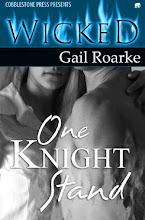Welcome to the third installment in the How I Write series. This series of posts is the brainchild of Ansha Kotyk, who--along with the other participants, including Yours Truly--haunts the forums (registration required) of the Romance Divas website. You can go here to find a list of all the participants with links to their individual blog posts. We'll each be posting on the same topic each Wednesday for the next two or three months--longer, if it goes well and we're having fun with it.
This week's episode: How I Research, and Knowing When To Stop.
Let's start with the latter question first. How do you know when to stop? Ultimately, when it's time to sit down and write, the time for research is over. Research, like endlessly revising a manuscript or trying to create the "perfect" opening sentence, paragraph, or chapter is really just procrastination dressed up as perfectionism. Research, like creating character bios, timelines, plotting, and so forth, exists to help you write a better, more entertaining story. It is not an end in itself. When and if it starts cutting into your writing time, you've done enough.
When I stand in front of my computer to start my dailing writing session, I put aside research. If there are questions that need answering, I either fake it (and plan to come back and put the real facts in later) or I just make a note to myself to "insert researched data here"...and keep writing. Letting myself get sidetracked by chasing down information during my writing time is a great way to waste a day. If I really need to do more research, it will get done some other time. In the evening, when I'm done with my writing for the day.
If by "knowing when to stop" you mean how do you know when you've accumulated enough data about the topic at hand...that's when the rule of diminishing returns comes into play. While a few well-chosen nuggets of historical/technical/cultural data can be just the thing to make your story real, too much of it bogs your story down. You'll invariably dig up a lot more information than you'll be able to use in a given story, though you can always use it later, in other stories. If you're collecting trivia? You've gone too far.
Ah, but how do I research?
I start with Wikipedia and Google. Wikipedia (a user-edited online encyclopedia, if you've been living in a cave for the last few years) is a great starting point. It's almost useless for politics and any other hotly-contested subject, but otherwise it's fairly helpful in getting an overview of a non-controversial topic, but its primarily useful for the citations to original sources. You needn't take anything for gospel--you can follow the links, or search out the sources with Google to confirm them. And in many cases, a quick overview, maybe some descriptions or pictures of the plants, animals, architecture, weapons, tools, or whatever are all I need.
If I need more, though, Google is a godsend. I remember sitting at home as a child (back when dinosaurs roamed the earth) thumbing through our encyclopedia (which got more out of date with every passing year), or trolling through the local public library or school library. It was a crapshoot whether I'd find much of anything about whatever topic I was obsessed with at the time. Now I type search terms into a computer in the privacy of my own home and can find out as much as I want to know on any conceivable subject. If it exists at all and it's online, I can find it quickly and easily, more often than not. If it's not online, well, that's what Amazon and other sites are for. I can find an actual book on the subject, buy it, and have it delivered to my door.
Once I've found my sources, it's simply a matter of determining how deeply I really need to delve, and then making notes of the salient points. As I said, less is often more. A smattering of details for flavor, backed up by research to assure that I don't make any egregious errors, is what my research is all about.
The History of Valentine's Day
-
Every February candy, flowers, and gifts are exchanged between loved ones,
all in the name of St. Valentine. But who is this mysterious saint and why
do ...
3 days ago












